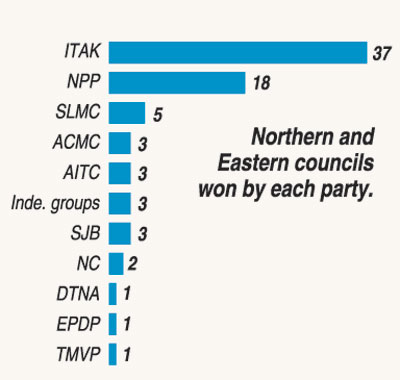As with the receding tide, the ‘Anura wave’ ebbed this election, with his party slipping to second place in the North and East. Regional parties recovered some lost ground and gained control of most local councils.
ITAK vote share surged in Jaffna, made significant strides in Vanni districts, and enjoyed a slight increase in the Eastern province. All Ceylon Tamil Congress (ACTC), who formed an alliance, doubled their vote share in Jaffna while Democratic Tamil National Alliance (DTNA’s) popularity grew in Vanni districts. Despite the arrest of their leader Sivanesathurai Chandrakanthan alias Pillaiyan, Thamil Makkal Viduthalai Pulikal (TMVP) saw minor gains in Batticaloa, while Sri Lanka Muslim Congress (SLMC) and All Ceylon Makkal Congress (ACMC) maintained their voter base in the Eastern province.
Tamil parties have called the results a reaffirmation of the North’s loyalty to Tamil parties, following the last election when for the first time in recent history a national party from the south swept the North and East (except Batticaloa). As with other parts of the country, many of the victories for individual Tamil parties were slim, and few councils saw a clear majority.

ITAK’s General Secretary M. A. Sumanthiran said that they will work on the principle that whichever Tamil party won the majority in a council should be given the opportunity to form a government with the support of the other Tamil parties. ITAK has already had discussions with the DTNA on formation of government and a potential revival of the Tamil National Alliance. “Working with NPP, however, is not really on the cards because we campaigned on the basis that local government should be with the Tamil parties,” said Sumanthiran, “we are the party that called for devolution of power so if local government is also with the central government party there is no point.”
NPP won four councils in the Northern province–mostly in the ethnically mixed Vavuniya district–and 14 in the Eastern province. Relative to the parliamentary election, however, this is a significant loss of control.
Dr. Mahendran Thiruvarangan, a lecturer at the University of Jaffna, said that NPP’s popularity declined in large part due to their failure to follow through on their promises to address Tamil issues. “There was a feeling that NPP’s movement on land returns, missing persons, PTA repeal, and release of political prisoners was slow,” he said, “the recent gazette appropriating almost 6000 acres of private lands in the Northern province has created further discontent.”
NPP’s losses in the North and East were, however, relatively minor relative to the large losses they suffered in the South. In fact, Northern districts–Mannar, Kilinochchi, and Mullaitivu–were the only ones that saw a spike in NPP popularity–albeit miniscule. Further, NPP’s popularity declined the least in Vavuniya, Batticaloa, Nuwara Eliya, and Jaffna with their vote share only reducing by 1-5 percent points, compared with the national average of 18 percent.
NPP emerged victorious in 18 councils in the North and East. Some of these victories were in Sinhala-majority Pradeshiya Sabhas such as Uhana, Dehiaththakandiya, and Kanthale. Three were in Tamil majority Nanattan, Vavuniya North and Vavuniya South-Tamil. Many of their victories were slim, and they will have to create coalitions to form a government.
“We are happy because despite heavy anti-NPP campaigning people trusted us with a large share of their votes in the North and East,” said Fisheries Minister and Northern NPP organiser Ramalingam Chandrasekar. He said the NPP will be open to joining together with individual council members from other parties or independent groups to create a government and resolve the Tamil people’s problems.
